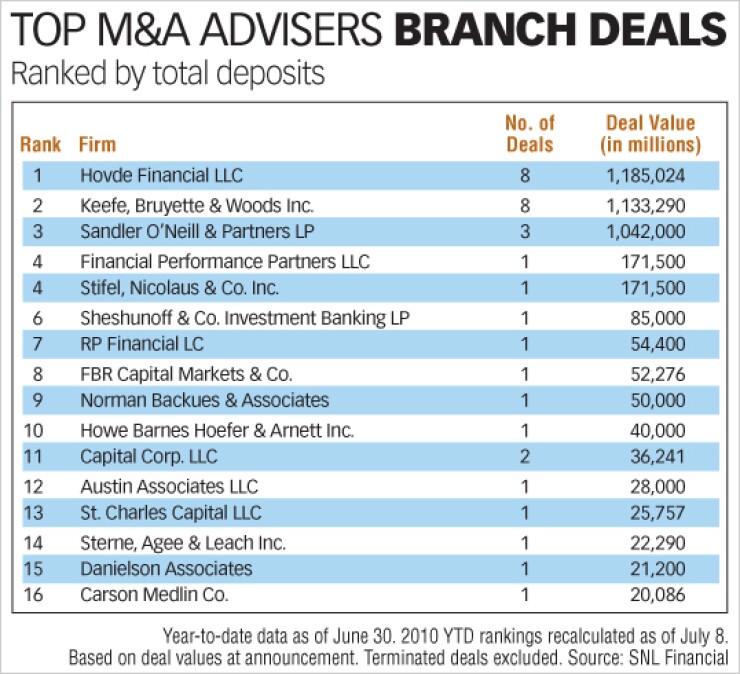


The mergers and acquisitions market is starting to shift to open-bank deals. That's because conditions to support this activity ripened last quarter: Lending fell. Balance sheets shrank. Revenue declined. Share prices stayed depressed. And failed-bank deals got pricier.
With such unrelenting pressure on earnings and stock prices, struggling banks are a lot more motivated to sell at bargain prices, instead of holding on to false hopes for improvement. And buyers have more incentive to act, instead of waiting until regulators come calling.
Bank executives and investment bankers predict that "live" mergers-those not engineered by the Federal Deposit Insurance Corp.-could accelerate by yearend. "The boards and their executive teams are tired. We're starting to see discussions pick up," said Carl J. Chaney, chief executive of the $8.5 billion-asset Hancock Holding Co. in Gulfport, Miss. "I'm getting more and more calls from investment banks."
Chaney, speaking at a Keefe, Bruyette & Woods community bank conference in late July, said he gauges the temperature of the bank M&A market by the volume of deal books that investment bankers send his way. By that measure, the sell-side of the market is much hotter than it was just four months ago.
Two July deals in Southern California illustrate the point. While two acquisitions might not sound like a lot, they represented the most open-bank activity for the entire state in any single month since December, according to SNL Financial LC.
Alex Cappello, CEO of Cappello Capital Corp., an investment bank in Santa Monica, Calif., says one reason for the renewed interest in open-bank deals is that increased competition to buy failed banks has driven up their prices.
When bidding for seized institutions, "you compete with a lot of people and you spend a lot of money on due diligence with no assurance that you will get the bank," he said.
An influx of equity to the market-despite the Golden State's high unemployment rate, budget crisis and depressed real estate market-also played a big part in California General Bank's deal for Professional Business Bank in Pasadena and Grandpoint Capital Inc.'s deal for First Commerce Bancorp in Encino.
By historical standards, deal activity is anything but normal. The continuing glut of bank failures is one reason. Figuring out what an unprofitable or barely profitable institution is actually worth is another. Doing a normal deal is still a leap of faith without many recent deals to compare prices with.
Besides that, few potential buyers stayed healthy by taking big risks. The same fragile economy that is pressuring sellers could discourage buyers from making a move.
"We don't want to mess up our bank," Bernard Clineberg, the chairman and CEO of the $2.1 billion-asset Cardinal Financial Corp. in Tysons Corner, Va., told investors at the KBW conference. Clineberg has a couple of criteria for a deal target. "It would have to be a strong leader in charge of that institution," he said. And "it would have to be safe."
Fred Cannon, a co-director of research at KBW and its chief equity strategist, said the ingredients are in place for normal deals. Consumer and business borrowing is down and will not rebound any time soon. Margins are shrinking as deposits swell and lending dries up. Regulatory changes are hurting income and expenses. Potential buyers, meanwhile, have lots of liquidity to deploy after raising capital. "Consolidation should be the natural result," Cannon said.
The two California deals would have drawn attention even in normal times because the buyers were much smaller by asset size than the targets. In each case, the buyer is using a capital infusion from a private-equity fund to support the growth spurt.
The $60 million-asset California General's deal for its hometown competitor Professional Business Bank is saving the target from a cease-and-desist order. Hardly two years old, California General is less than a quarter the size of Professional Business Bank, with $305 million in assets. But its parent company's sole shareholder, Carpenter Community BancFund, supplied the necessary extra capital. Grandpoint, whichraised nearly $350 million of capital last year, is on its second deal. The Los Angeles company bought the $25 million-asset Santa Ana Business Bank in June, which is being used as a vehicle to acquire the $336million-asset First Commerce.





